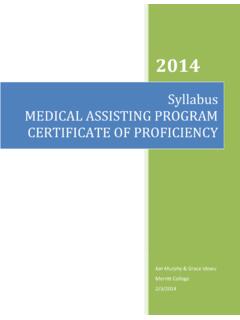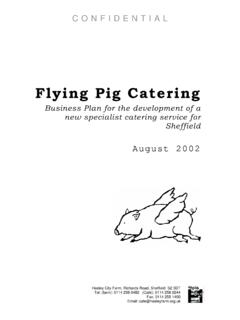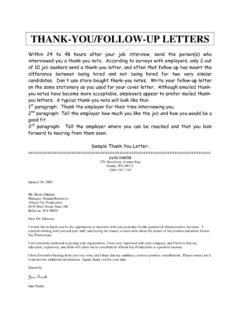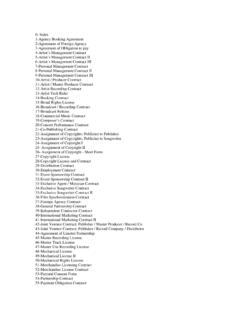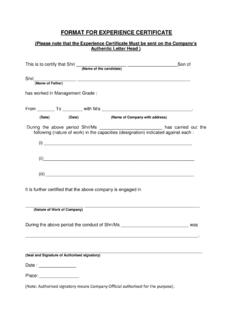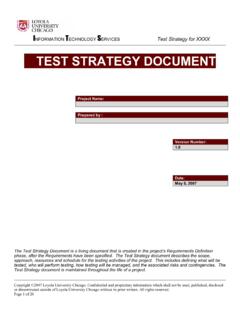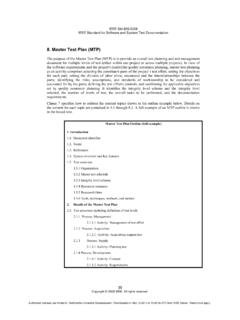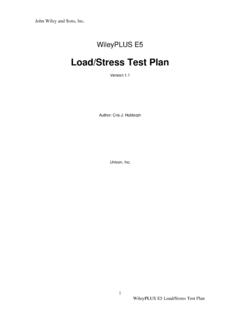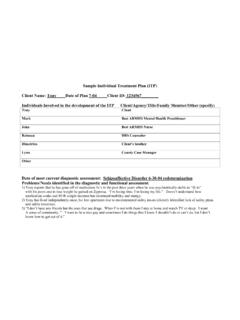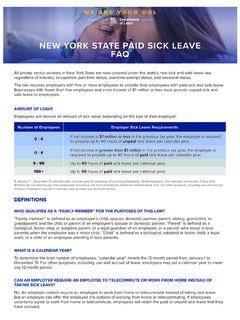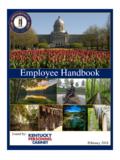Transcription of Casual employment agreement
1 KSH-339240-19-14-V1:lh [NAME OF EMPLOYER] Casual INDIVIDUAL employment agreement agreement made this _____ day of _____ 20_____ PARTIES 1. [NAME OF EMPLOYER] ( Employer ) 2. _____ ( Employee ) TERMS OF employment The terms of employment are as follows: 1. Commencement/term: The position will commence on the first day of work offered (if any). The Employee acknowledges that the position is a Casual as required position. No minimum level of work, pattern of hours, or days of work is guaranteed by the Employer. 2. Remuneration: (a) The Employee shall be paid a wage of $_____ per hour gross. (a) The Employee shall be paid at the rate of $_____ per bin ( bin rate ) (provided that payment at the bin rate shall not equate to less than $ per hour). (DELETE ONE) (b) The Employee will only be paid for hours worked or for approved paid leave hours. The Employee will need prior approval to work hours in excess of usual work hours.
2 (c) The Employee shall be paid for any hours worked _____ (pay period) in arrears. Payment shall be made by _____ (pay method). 3. Work hours: (a) Under the terms of this agreement , the Employer may offer work to the Employee from time to time, whether for a few hours, a day or a week. Whether work is available and the amount of work available will depend on the changing requirements of the Employer. If work is offered there is no guarantee of the hours that will be available on any particular day, unless specifically agreed in advance. Once an agreed period of work has ended, the Employer is not obliged to offer further work to the Employee. The Employee s employment will end at the end of each agreed period of work. However, the terms of this agreement will continue to apply to any further periods of work agreed. (b) The Employee acknowledges that any work offered is subject to favourable weather as set out in clause (e) below and is subject to the Employer s picking and packing requirements, which may change at any time.
3 (c) The Employee will be offered work [by a telephone call from or verbal discussion with the Employer]. (d) The Employee is not obliged to accept, or remain available for, further periods of work offered. (e) If the Employer has offered work to an Employee for a certain day, which the Employee has accepted, but on the day in question it is not possible to carry out the work due to weather conditions (including but not limited to rain, frost or heavy dew), the Employee will no longer be required to work on this day and will not be paid. The Employee also acknowledges that if he/she commences work on a particular day but is required to cease work due to weather conditions (including but not limited to rain, frost or heavy dew), he/she will only be paid for the actual hours worked. 4. Rest / Meal breaks (a) The Employee shall be entitled to the following rest breaks and meal breaks: (i) One paid 10 minute rest break where the Employee works between two and four hours; (ii) One paid 10 minute rest break and one unpaid 30 minute meal break where Employee works between four and six hours; or (iii) Two paid 10 minute rest breaks and one unpaid 30 minute meal break where the Employee works between six and eight hours.
4 (b) Where the Employee works more than eight hours, the calculation of break entitlements shall begin again at the beginning of each eight hour period of continuous work. (c) The Employee acknowledges that flexibility is required in relation to the taking of lunch and other breaks in order to meet the requirements of the Employer s business. 5. Place of work: The Employee shall work at the Employer s premises at _____or at such place or places within the greater Bay of Plenty region as directed to meet the requirements of the Employer s business. The Employee shall be required to provide his/her own transport to and from work. Other locations may be agreed between the Employer and Employee at the time work is offered. 6. Termination and suspension: The minimum period of notice for termination by either party shall be 2 working days notice.
5 The Employer may give pay in lieu of all or part of the notice period. If the agreed period of work is 2 working days or less, the agreement may not be terminated early except by the Employer where there are grounds for immediate termination, such as serious misconduct. The Employer will be entitled to suspend the Employee where it is reasonable and appropriate to do so, including when the Employer has grounds for suspecting serious misconduct by the Employee or where there is a health and safety risk. Suspension will be on pay during any period the parties have agreed the Employee will work and shall not prevent employment expiring at the end of the agreed period of work. 7. Time records: If required by the Employer, the Employee shall keep an accurate record of time worked and shall submit a time sheet to the Employer in a form, and at the times, required by the Employer.
6 KSH-339240-19-14-V1:lh 2 8. Job description: The Employee is employed as a _____. The Employee shall be required to _____(insert duties) as well as any other duties reasonably required by the Employer. Other duties may be agreed between the Employer and Employee at the time work is offered. 9. Essential requirements for the role: (a) The following are essential qualifications/requirements for the position: (i) Legally entitled to work in New Zealand; and (ii) _____. (b) By signing this agreement , the Employee confirms he/she has these qualifications/meets these requirements. The Employee agrees to provide proof of the above on request. The Employee will inform the Employer immediately of any change in or potential risk to the above qualifications/requirements. If the Employee does not meet these essential requirements or ceases to do so during his/her employment , the Employer may terminate employment .
7 10. Supervisor: The Employee shall be required to report to _____. The Employer may change the supervisor from time to time. 11. Public Holidays (a) The Employee shall be entitled to public holidays in accordance with the Holidays Act 2003. (b) If a public holiday falls on a day that would otherwise be a working day for the Employee and the Employee does not work that day, the Employee shall be entitled to be paid their relevant daily pay for that day (or their average daily pay, if applicable). If a public holiday falls on a day that would not otherwise be a working day for the Employee and the Employee does not work that day, the Employee is not entitled to be paid. (c) The Employee agrees to work public holidays that fall on a day that would otherwise be a working day for the Employee, if required by the Employer. If the Employee is required to work on a public holiday, the Employee will be paid at the rate of time and one half of the Employee s relevant daily pay (or average daily pay, if applicable) in relation to the time actually worked.
8 (d) The Employee shall be entitled to an alternative paid holiday to be taken on a day as agreed between the Employer and the Employee where a public holiday falls on a day that would otherwise be a working day for the Employee and the Employee is required to work on that public holiday. (e) The Employer shall in its discretion be entitled to pay the Employee s average daily pay under the Holidays Act 2003 in any case where relevant daily pay is usually paid and/or is referred to in the above sub-clauses, if: (i) the Employee s daily pay varies within the pay period in which the holiday falls; or (ii) it is not possible or practicable to determine the Employee s relevant daily pay. 12. Determination of what would otherwise be a working day (a) For the purposes of public holiday, bereavement and sick leave entitlements, where it is unclear the Employer will endeavour to agree with the Employee whether a day would otherwise have been a working day for the Employee, taking into account this agreement (including but not limited to clauses 3(b) and e) and other relevant factors including: (i) the Employee's work patterns; (ii) the fact the Employee works for the Employer only when work is available; (iii) the reasonable expectations of the Employer and the Employee that the Employee would work on the day concerned; and (iv) whether, but for the day being a public holiday or a day the Employee took sick or bereavement leave , the Employee would have worked on the day concerned.
9 (b) If the Employer and Employee can t agree on whether a day would otherwise have been a working day, either party may seek a determination from a Labour Inspector. 13. Annual Holidays: Because the Employee works on a basis that is so intermittent or irregular that it is impracticable for the Employer to provide annual holidays, the Employee agrees that: (a) The Employee shall be paid annual holiday pay at a rate of 8 percent of the Employee s gross earnings (less PAYE) with and on top of the Employee s regular pay; and (b) The Employer shall provide for such payment to be an identifiable component of the Employee s regular pay. 14. Qualification for bereavement and sick leave : (a) As employment is not continuous, the Employee shall not qualify for bereavement or sick leave unless the Employee has worked for the Employer over the previous 6 months for: (i) An average of 10 hours a week; and (ii) No less than 1 hour in every week or no less than 40 hours in every month.
10 (b) If the Employee qualifies for sick and bereavement leave : (i) the Employee is entitled to 5 days paid sick leave over the following year in accordance with the Holidays Act 2003. After each further year, the Employee may qualify for a further 5 days sick leave , if the Employee continues to meet the above minimum hours requirements. Untaken sick leave may be carried over each year up to a maximum of 20 days entitlement. (ii) The Employee is entitled to 3 days bereavement leave on the death of a close family member as defined in the Holidays Act 2003 and 1 day s bereavement leave on the death of another person if the Employee has, in the Employer s opinion taking into account relevant factors under the Holidays Act 2003, suffered a bereavement . KSH-339240-19-14-V1:lh 3 (c) If the Employee qualifies for sick and bereavement leave , the Employee will only be able to take that leave where the relevant day would otherwise be a working day for the Employee and will be subject to the usual obligations under the Holidays Act 2003 (such as to provide proof of sickness or injury on request).
